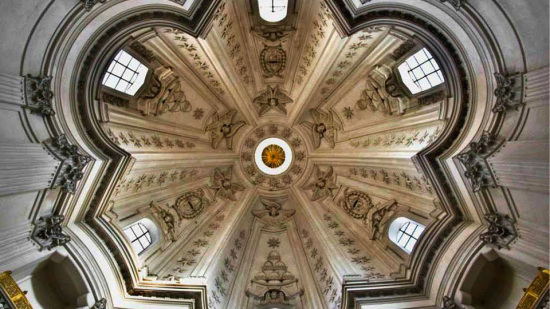La Sapienza opens this week at the Northwest Film Forum. I caught the film last fall at the Vancouver International Film Festival and the following is adapted from the dispatch I wrote last year.
Like director Eugène Green’s other films (I watched 2001’s Toutes les units and 2004’s Le Pont des Arts in preparation for the festival, having never seen any of Green’s other work), La Sapienza features an unusually declamatory acting style, with a Bressonian minimization of emotion (though notably not as extremely robotic). Also Bressonian is a penchant for introducing scenes and characters with close-ups of their feet, or rather, their shoes. Green apparently is a big fan of shoes (not that there’s anything wrong with that). He films his characters’ conversations at right angles, a two-shot with them facing each other, perpendicular to the camera, followed by medium close-ups of each actor as they face the camera directly and speak in turn, Green not cutting until they’ve finished what they have to say. This combination of effects reminds me very much of Manoel de Oliveira, though the artifice is apparently indebted as much to Baroque theatrical technique as any cinematic fore-bearer. Green is said to be an expert in this, and knowing absolutely nothing about the subject myself, I’m in no position to disagree.

La Sapienza concerns itself with a married couple, an architect and a social worker, who seem very depressed and go on vacation in Switzerland. They meet a young brother and sister and become attached to them. The girl has fainting spells (“wasting sickness” perhaps, which should have died out in 1914, we’re told), the boy is an aspiring architect. The wife sends the boy with her husband on a tour of Baroque churches, while the two women stay behind and have frequent talks. The man (an excellent performance from Fabrizio Rongione, who played Marion Cotillard’s husband in Two Days, One Night) is obsessed with the story of Francesco Borromini, a dreamer of an architect who had a more rational-minded rival and came to a bad end. As the film progresses, he tells us and the young man the story of the two dueling architects, while Green lovingly points out the marvels they constructed, with gorgeous pans and tilts following the lines of their churches as the reach toward the heavens. Like Roberto Rossellini’s masterpiece Voyage to Italy, the film’s most obvious reference point, the touch with the past transforms and reinvigorates the middle-aged marrieds.
The remarkable thing about the film, aside from the fact that I saw it on a Saturday afternoon, in a sold out auditorium that was 100% into it, laughing at all the right places and genuinely moved, is that it, and Green himself, even exist at all. How wonderful a world is it that provides a space for a weird expatriate-American Francophile, obsessed with Baroque theatre, to make odd little romances about the persistence and continuing relevance of ancient arts and archaic words? Green himself has a role in the film, bigger than the cameos in the other films of his I’ve seen, where he plays an old man the wife meets on a park bench at night. He explains that he is a refugee, a Chaldean from the Ninevah plain, an ethnic group she believed to be extinct. But no, he explains, they are still very much around, though in diminished numbers. A more fitting role for M. Green I cannot imagine.
La Sapienza plays Friday June 5th through Thursday June 11th at the Northwest Film Forum.

